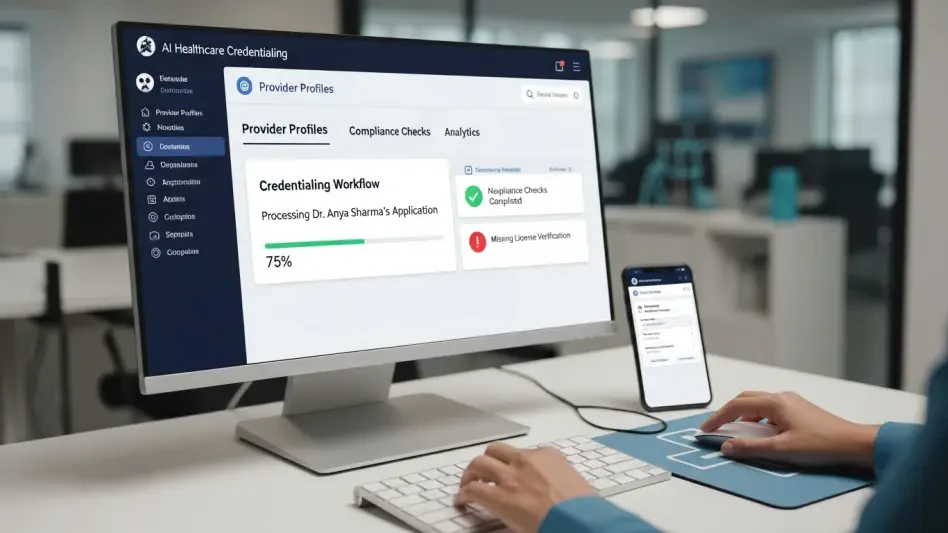Understanding the Healthcare Credentialing Landscape
In the complex ecosystem of healthcare, credentialing stands as a critical gatekeeper, ensuring that providers meet stringent qualifications before delivering patient care, a process vital for regulatory compliance and patient safety. This procedure verifies a provider’s education, training, and licensure, forming the backbone of trust in medical services. However, the stakes are high, as any lapse can lead to severe legal and operational repercussions for healthcare organizations. The industry currently grapples with balancing accuracy and efficiency, especially as the demand for healthcare services continues to surge.
Traditionally, credentialing has relied heavily on manual processes, where administrative teams painstakingly complete forms, verify data, and track compliance requirements. These labor-intensive methods often result in significant delays, human errors, and overwhelmed staff, particularly in small to mid-sized facilities with limited resources. Major players like MedTrainer have emerged as key innovators, leveraging technology to address these inefficiencies. The integration of digital tools is reshaping the sector, pushing organizations toward automation to mitigate risks and streamline operations.
The role of technology, especially artificial intelligence, cannot be overstated in this transformation. Companies are increasingly adopting solutions to handle repetitive tasks, reduce error rates, and expedite provider onboarding. MedTrainer, a prominent name in healthcare compliance, exemplifies this shift by offering platforms that tackle the bottlenecks of manual credentialing. As the industry evolves, the focus remains on harnessing such advancements to meet both operational needs and regulatory demands.
The Role of AI in Transforming Credentialing Workflows
Emerging Trends in Automation and Digital Solutions
Healthcare administration is undergoing a profound digital transformation, driven by the need to eliminate operational inefficiencies that plague traditional systems. AI-driven automation has surfaced as a powerful tool, redefining how credentialing workflows are managed by replacing outdated manual methods with intelligent systems. This shift aligns with a broader industry trend toward digitization, where data handling, process streamlining, and compliance tracking are increasingly managed through advanced technologies.
MedTrainer’s AI Form Mapping represents a significant milestone within these emerging trends, offering a solution that automatically links form fields to platform data points. This capability minimizes the need for manual input, ensuring faster and more accurate processing of credentialing documents. By integrating with features like automated data population and extraction, it reflects the growing reliance on smart tools to simplify complex administrative tasks in healthcare settings.
The momentum behind such innovations signals a clear direction for the sector, as organizations prioritize scalability and precision. Beyond individual tools, the trend encompasses a holistic approach to digital solutions, where interconnected systems enhance visibility and control over compliance processes. MedTrainer’s contributions highlight how automation is becoming indispensable for staying competitive in an increasingly demanding environment.
Impact and Benefits of AI Integration
The integration of AI into credentialing workflows delivers tangible benefits, with MedTrainer’s tools leading the charge in reducing errors that often arise from manual data entry. By automating form completion and data verification, the platform significantly cuts down on mistakes, ensuring that provider information is accurate and up-to-date. This precision is crucial for maintaining trust and meeting stringent industry standards.
Beyond error reduction, the technology accelerates provider onboarding, allowing healthcare professionals to begin treating patients much sooner than traditional methods permit. Faster onboarding directly translates to improved access to care for patients and enhanced revenue cycles for organizations, as delays in credentialing often result in lost income. MedTrainer’s solutions thus address both clinical and financial pain points with remarkable efficiency.
Operationally, the impact is equally profound, as administrative teams are freed from repetitive tasks to focus on higher-value verification activities. This shift boosts overall productivity and enables organizations to allocate resources more effectively. With potential revenue growth tied to quicker credentialing timelines, the adoption of AI tools like those offered by MedTrainer presents a compelling case for modernizing healthcare workflows.
Challenges in Traditional Credentialing Processes
Manual credentialing processes have long been a thorn in the side of healthcare organizations, characterized by persistent delays that hinder provider readiness. Completing extensive forms and verifying qualifications by hand can take weeks, if not months, stalling patient care and straining operational timelines. For small to mid-sized facilities, these delays are particularly crippling, as they often lack the staff to manage such intensive workloads.
Error risks compound the issue, with even minor mistakes in documentation leading to compliance violations or rejected applications. The administrative burden further exacerbates the problem, as staff spend countless hours on data entry rather than strategic oversight, draining resources and morale. These challenges create a cycle of inefficiency that many organizations struggle to break without technological intervention.
MedTrainer’s AI-driven solutions offer a direct counter to these obstacles by automating repetitive tasks like form mapping and data input, ensuring accuracy through intelligent systems. While the technology markedly improves efficiency, areas such as user training and system integration remain critical for maximizing impact. Addressing these aspects can further enhance the transition from manual to automated workflows, providing a more seamless experience for healthcare administrators.
Compliance and Regulatory Implications of AI Credentialing
Navigating the regulatory landscape of healthcare credentialing requires strict adherence to standards that govern provider verification and compliance. Bodies like the Joint Commission and state licensing boards set rigorous guidelines to ensure that only qualified professionals deliver care, placing immense pressure on organizations to maintain flawless records. Non-compliance can result in penalties, legal challenges, and reputational damage, making accuracy paramount.
MedTrainer’s AI tools bolster adherence to these regulations by automating critical functions such as license expiration checks and recurring exclusion monitoring. These features minimize the risk of oversight, ensuring that providers remain in good standing with regulatory requirements. By embedding compliance into the credentialing workflow, the platform reduces the likelihood of costly violations while simplifying audits and reporting.
The broader implication of AI in this space lies in its ability to adapt to evolving regulations, offering scalability as standards change. Automated systems provide real-time updates and alerts, keeping organizations ahead of potential issues. This proactive approach not only safeguards compliance but also builds a foundation of trust with regulators and patients alike, reinforcing the value of technological integration.
The Future of AI in Healthcare Credentialing
Looking ahead, the adoption of AI in healthcare compliance is poised to accelerate, driven by the need for efficiency in an increasingly complex industry. Emerging tools, including advanced machine learning algorithms and predictive analytics, are expected to further refine credentialing processes by anticipating compliance risks before they arise. MedTrainer stands at the forefront of this innovation, continuously evolving its platform to meet future demands.
Potential disruptors, such as new regulatory frameworks or competing technologies, will likely shape the trajectory of AI integration over the coming years. From the current year through 2027, the focus will likely center on interoperability, ensuring that systems can seamlessly communicate across diverse healthcare environments. MedTrainer’s role as an innovator positions it to lead in addressing these challenges, setting benchmarks for others in the field.
The ongoing digital transformation, coupled with growing demand for healthcare services, will continue to influence credentialing workflows. As organizations face pressure to scale operations while maintaining compliance, AI solutions will become non-negotiable for staying agile. The future promises a landscape where technology and regulation evolve hand-in-hand, with pioneers like MedTrainer driving progress toward more efficient and reliable systems.
Conclusion: MedTrainer’s Impact and Industry Outlook
Reflecting on the transformative journey of AI in healthcare credentialing, MedTrainer’s contributions through innovations like AI Form Mapping mark a turning point for operational efficiency. The platform’s ability to automate complex tasks and ensure compliance has reshaped how organizations approach provider onboarding and regulatory adherence. This shift alleviates long-standing burdens, setting a new standard for accuracy and speed in the industry.
As a next step, healthcare organizations are encouraged to prioritize the adoption of AI-driven tools to stay competitive and compliant in a dynamic environment. Investing in training and system integration proves essential for maximizing the benefits of automation, ensuring staff can leverage technology effectively. Collaborating with innovators like MedTrainer offers a pathway to navigate future challenges with confidence.
Looking beyond immediate gains, the industry outlook suggests a continued emphasis on scalability and adaptability. Stakeholders are advised to monitor regulatory changes and emerging technologies closely, preparing for shifts that could redefine credentialing norms. By embracing digital solutions, organizations position themselves to not only meet current demands but also anticipate future needs, securing long-term success in healthcare delivery.









